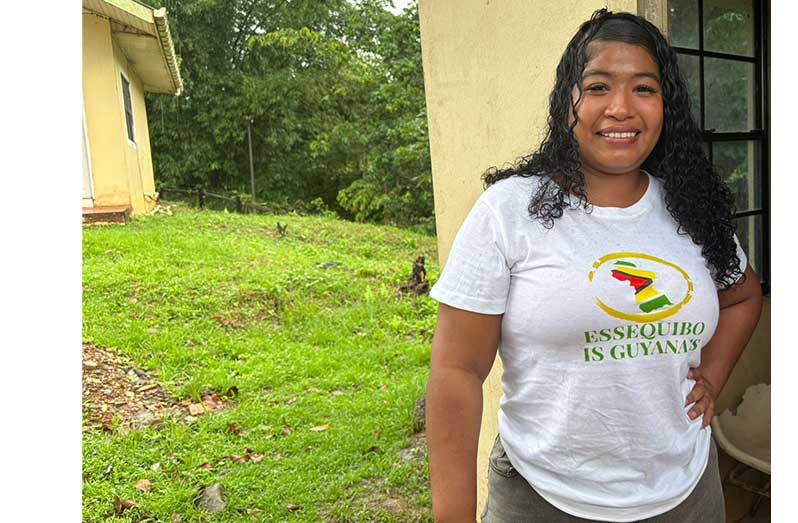—Venezuelan migrant rejects Bolivarian Republic’s baseless claims, willing to defend nation against Maduro regime’s actions
AS the Nicolas Maduro regime continues to push Venezuela’s spurious claim to Guyana’s Essequibo, region one, Venezuelan migrant is taking a stand against it.
Maria Revero, who has lived in Guyana for nearly a decade, affirmed that the Essequibo Region belongs to Guyana.
The Guyana Chronicle visited the Arakaka village in Region One (Barima-Waini) on Sunday, where a reporter spoke to Revero, and others, while observing how the villagers carried out their daily lives in peace.
Revero, like many other migrants, fled the economic hardships and political turmoil in her homeland, Venezuela, in search of peace, safety and a future. In Guyana, she found all three.
Today, she enjoys a peaceful life with her husband while raising a four-year-old child in a country that welcomed her with open arms, despite the growing hostility being pushed by the Bolivarian Republic.
“I know Essequibo belongs to Guyana,” she said firmly, adding: “I really free. I really good.”
Her words cut through the noise from the Venezuelan government over Guyana’s Essequibo region. Those claims are branded as baseless by Revero and many others.
She highlighted that although Venezuelans face threats from their homeland for supporting Guyana in the border controversy, she is unmoved by those scare tactics and will defend Guyana’s territory not just with her voice, but with the truth, which is, Essequibo belongs to Guyana.
Revero’s story is not just one of survival but one of love and loyalty. For her, Guyana’s Essequibo is not up for debate.
There were no Venezuelan elections held in Essequibo, she further pointed out. The Bolivarian Republic had threatened to elect a governor and legislative council for Guyana’s Essequibo Region, in a process that was widely rejected by Guyanese and Venezuelan migrants on Sunday. Persons report no signs of Venezuela’s sham elections.
The people living in the Essequibo Region live under the laws and protection of Guyana.
On 3 October, 1899, the Arbitral Tribunal delivered its Award, which determined the boundary between Venezuela and then British Guiana (“the 1899 Award”).
The 1899 Award was the culmination of arbitral proceedings during which the respective territorial claims of Great Britain and Venezuela were addressed at great length and in detail by distinguished legal counsel representing the two states, including through many thousands of pages of written submissions and more than 200 hours of oral hearings before the Arbitral Tribunal.
For more than six decades after the 1899 Award was delivered, Venezuela treated the Award as a final settlement of the matter. It consistently recognised, affirmed and relied upon the 1899 Award as “a full, perfect, and final” determination of the boundary with British Guiana.
Between 1900 and 1905, Venezuela participated in a joint demarcation of the boundary, in strict adherence to the letter of the 1899 Award, and emphatically refused to countenance even minor technical modifications of the boundary line described in the Award.
Venezuela had proceeded to formally ratify the demarcated boundary in its domestic law and thereafter published official maps, which depicted the boundary following the line described in the 1899 Award.
Venezuela, however, after more than six decades ago, reversed its position in the years before Guyana’s independence in 1966, asserting a claim to the Essequibo region, which accounts for two-thirds of Guyana’s territory and is rich in natural resources.
In 1966, the governments of the United Kingdom, British Guiana, and Venezuela signed the Geneva Agreement, aiming to resolve the matter through diplomacy.
But despite numerous attempts over the subsequent years, the controversy remained unresolved, prompting Guyana to refer the matter to the United Nations (UN) in 2018. The UN Secretary-General chose the International Court of Justice (ICJ) as the forum to settle the matter definitively.
The case has moved through several stages since its initiation in 2018, with Venezuela filing multiple objections to the ICJ’s jurisdiction.
However, in both 2019 and 2022, the Court rejected these objections, affirming its jurisdiction over the case. Now, the Court is examining the merits of the controversy; this is a process which Guyana is fully committed to.












